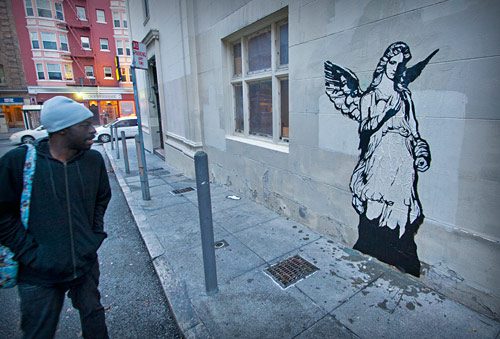
Our culture is drunk with a compassion for humanity. This would be fine and dandy but for the fact that we haven’t a drop left for actual human beings. We simultaneously want cooperations that behave generously, philanthropically and kindly to the poor, and anti-begging laws to keep the poor away from us. We somewhat vaguely want to make the lives of women to be easier, and we are willing to kill the unborn human for it. We believe that all of humanity deserves free medical treatment, which is of course a noble goal, but a the same time we want no more than the answer “fine” to the question “how are you?” no matter what the person’s actually state of being. We want everyone to have a job, and we treat service-industry workers like ghosts. We are a pluralistic society, true, but only in the sense that we love plurals more than singulars, mankind over a man, with an unhealthy appreciation for the brotherhood of man at the expense of a man’s living, breathing, drinking, and vulgar brothers.
But there is hope. There is a moment in all of our lives when this appreciation of the singular human is restored — the moment of holding a newborn baby. Here the full value of the human person floods us. Our natural inclination is not simply to give the baby his necessities, but to gaze in silent worship at the tiny fingernails, the nose barely more than a lump, the searching, seeking eyes. Why? Surely it is no mere matter of size, for we hardly go into joyful conniptions over a dwarf, nor do we assign value to our brothers and sisters with a ruler. No, we adore him for his innocence. We adore because the newborn is new, the most ancient of novelties. We adore because we are seeing him for the first time.

Then these newborns grow and — unless we are their parents — we lose our instinct of awe. This is a tragedy, if only because it is not true. We marvel at babies because they are new, but I maintain that the claim of subsequent aging is a puffed-up myth. Human beings are always new. Their toddlerhood is their first toddlerhood, their adolescence their first adolescence, and their adulthood– whatever on earth that means — might as well be their infancy. When we meet a man on the street, we are meeting a newborn.
If the Hindu concept of reincarnation were true, then perhaps we would have an excuse to be bored with other human beings, an excuse for our current treatment of our brothers. Here is a baby, we might say. This is his 47th infancy. His hands are small and they will be small again, and again, and again. But the Christian worldview — in a stodginess that allows me to breathe freely — denies this, and denies it adamantly. A human life is almost blasphemous in its existence. You are born once, an entirely unique and unrepeatable human being. You will die once, never to return. You are a blight unaccounted for. I hate to say it, but Katy Perry was right: Babies are fireworks, from the ignition of conception to the explosion of death. We crowd the streets with our neighbors to gaze and wonder at an eclipse that will not repeat itself for another 300 years — but is it not equally true that our neighbors will never repeat themselves, and that we should look at them with an even greater reverence?
But we don’t. And we would be damned by our silly world, never to see our brothers and sisters in the light of day, if it were not for this:
It is an incredible fact — and one that I should be shot for not noticing until now — that it is not only acceptable, but rather expected that you treat your lover like a newborn baby. You develop pet-names, speak softly, create a nonsense language, marvel at fingers and hands — you smell the top of each other’s heads, for goodness’ sakes! And these actions — while certainly part of eros — are not immediately associated with sex. You’d hardly find an honest woman who would claim that goo-goo talk with her man is only foreplay. This is not to say that these things cannot be part and parcel of the awesome and beautiful marital act, but simply that they are first and foremost a product of the reality of love between the husband and wife. In somewhat of a profound mystery, Love urges us to treat another like a newborn. It is Love that inspires us to reject the lie that human beings grow old, and thus boring, and instead to call a human being what they are: Baby. Love is not blind, it is the gift of sight! It removes the cataracts of boredom and repetition, allows us to see each other for the first time.
For the Christian, this should be no surprise. Look at what our our great Lover and Bridegroom calls us to become: Little children. Look at the name we are blessed with: Children of God. There are no adults in the eyes of God. Why? Because God is Love, and Love sees for the first time.
Did He not tell us this very truth? When Christ said “I make all things new,” he was really saying something extraordinarily practical: He was telling us his name. He did not say, “I will make some things new,” nor “I sometimes make things new.” No, Christ defined his whole being. I am He who makes all thing new. I am Love. It is the very nature of God — unbound by time — to see us as when we were created. We are forever his newborns. This is why the prophet Zephaniah proclaims that “He will take great delight in you, He will quiet you with His love, He will rejoice over you with singing.” Quiet me? Sing over me? These are not the actions of the aloof dictator or heartless clockmaker that the world would have God limited to. These are the actions of a Father marveling at his newborn baby, the actions of a God of Love and Truth and Beauty and Goodness, holding you, filled with joy over the fact of your fingers and toes, overwhelmed by how immensely beautiful you are. This is our God. Thus, becoming “like little children” is not an action that requires a great effort on our part — it is simply the recognition of who we truly are. When we live like little children we are happy, not only because we are free to put all concerns in the hands of God, but also because we are for once free to be ourselves.
As Christians we are called to see our brothers and sisters with the eyes of God, and thus with the eyes of Love. We are called to see their immense value, not for what they do — Heaven knows we can be a vindictive, spiteful bunch — but for who they are. Obviously, this does not mean treating every man we meet like a baby. But it does mean that we should allow the wonder, the mystery and the beauty of life — that unrepeatable, ever-new gift — to fill us every time we are with our fellow man. This is his commandment, that we love one another, that we see each other in the light of day, that our joy may be full. Let us be born again indeed.















